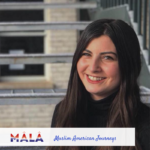Leena Zahra: Centering Identity in Community Engagement
Leena is a Syrian American who is proud of both her American and Syrian culture and strives to show how knowing your history can lead to knowing your identity which can then help your mental health.
I was born and raised in Cleveland Ohio, and so I am very proud of my midwestern roots, so look at me now, I am still in Chicago so too much hasn’t changed. I grew up very grateful, grew in a very loving, large family, my parents are Syrian immigrants, and that surely has shaped my identity, my upbringing, kind of navigating the world of being an American, a very proud American, but also being very proud of my Syrian culture, heritage and also my Muslim identity.
As long as I can remember, I would go to spend my summers in Syria at a very young age, we would spend four-five months at a time, so I felt like a big part of the year was going to Syria. When I was really young, there are definitely things that I am not particularly proud of. When I was a kid, when I would go to Syria, I would be like, “Well, where is the McDonalds?” I am like this six-year-old, and I am trying to understand why there are such vast differences between things that I saw in the staple American culture that I like, and then going to Syria, and then being like, “Where is everything that I’m used to”, in a selfish way. Growing up, I really started to appreciate and value the things that were really different, when I would go to Syria, it was all about family and connection and seeing my neighbors, talking to my neighbors, spending all parts of the day and night talking and sharing stories. In a way, that was for me, starting to shape the thought that this is why things are so different, these are things that I am coming to really value, especially for someone who is growing up in a different type of society.
It’s not easy to always form your own path, that can be applied to anyone, everywhere, it can be really daunting and intimidating, especially if not everyone has the same understanding or perspectives. I definitely see growing up in my educational/professional careers, I wanted to be surrounded by people different from me but also really amplify voices and stories in my culture, in my heritage, and in my religion. So what I really appreciate what my family instilled in me, and that is slowly starting to happen in this generation or with different cultures and backgrounds, is just asking for help. I think oftentimes, the connotation of asking for help is seen as weak, as not strong enough to handle your issues, or this taboo of mental health that I am definitely starting to see more in my communities, that i am appreciating, and that’s something that I value and share with my family. So ask for help always, it’s not a bad thing, Whether your working in the non-profit sector, whether you identify as a first-generation immigrant or a marginalized discriminated community, ask for help. People might not know that you’re seeking it, so ask for help.
I just strongly encourage people to look into your history, don’t ignore your history, look into whats happened, understand that for everything that your seeing, questioning, dismantling, there’s a reason why those systems are in place, why maybe a diaspora has gone to all parts of the world and done amazing things in different parts of the world, so look at how it started. I think seeing how things are going, especially with COVID-19, you’re going to have to find a place to connect and build a community, and that’s very important. So I think knowing history, never doubting or ignoring it, and then building a sense of who you are in a community and creating ways to support and help each other goes a long way. I think what I have seen in the younger generation, which is great, is that this idea of who you are and the different ways your identity shapes and forms your decisions is beautiful and should be valued.
Its easier said than done, just because certain communities have been discriminated against in the past and still are, but what I’m saying is that we need to work together to support any type of marginalized and discriminated community, no matter their identity, no matter where their geographic location is, no matter their immigration status.


